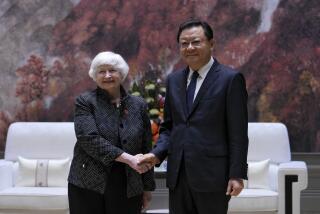Bernanke scolds China over currency policies
- Share via
Reporting from Beijing — Federal Reserve Chairman Ben S. Bernanke, in text for a upcoming speech, strongly criticized China and other emerging countries that he said were stunting a balanced global economic recovery by manipulating their currencies.
“Some economies have fully recouped their losses while others have lagged behind,” Bernanke said in a speech to be delivered Friday in Frankfurt, Germany. “But at a deeper level, the tensions arise from the lack of an agreed-upon framework to ensure that national policies take appropriate account of interdependencies across countries and the interests of the international system as a whole.”
The text of the speech, which was posted on the Fed’s website in advance of the speech, also defended U.S. stimulus measures.
Bernanke took aim at countries such as China, which has taken steps to keep its currency weak to promote its exports. The Fed chairman argued that the practice has allowed exporting countries to overheat at the expense of nations such as the U.S., creating what he calls a “two-speed global recovery.”
Bernanke has been under fire for the Fed’s decision Nov. 3 to buy $600 billion in U.S. Treasury bonds to suppress interest rates and stimulate the economy. Supporters of the plan, known as quantitative easing, say the stimulus is vital to reducing unemployment, giving businesses access to cheaper loans. It also aims to get Americans to spend more.
Critics in the U.S. worry that the move would raise inflation and spark speculation on stock markets. Policymakers in emerging economies, especially China, fear that the money would create asset bubbles in their countries. They have accused the Fed of trying to weaken the dollar to boost U.S. exports.
“The Fed has the right to make its own decision … but they should not only address their economy, but also take into account the impact on other countries,” China’s vice foreign minister, Cui Tiankai, said earlier this month.
To combat what it called hot money inflows, China has increased the amount in reserves that banks must hold, and it raised benchmark interest rates to soak up excess liquidity in the economy.
China has also tightened rules on real estate purchases for foreigners for fear that easy money from abroad could exacerbate an already overheated property market.
Bernanke dismissed the complaints, arguing that China is just as responsible for injecting money into the U.S. economy by its accumulation of foreign reserves to keep its currency undervalued.
“The total holdings of foreign exchange reserves by selected major emerging market economies … have risen sharply since the crisis and now surpass $5 trillion — about six times their level a decade ago,” he said in the speech text. “China holds about half of the total reserves of these selected economies, slightly more than $2.6 trillion.”
More to Read
Inside the business of entertainment
The Wide Shot brings you news, analysis and insights on everything from streaming wars to production — and what it all means for the future.
You may occasionally receive promotional content from the Los Angeles Times.











